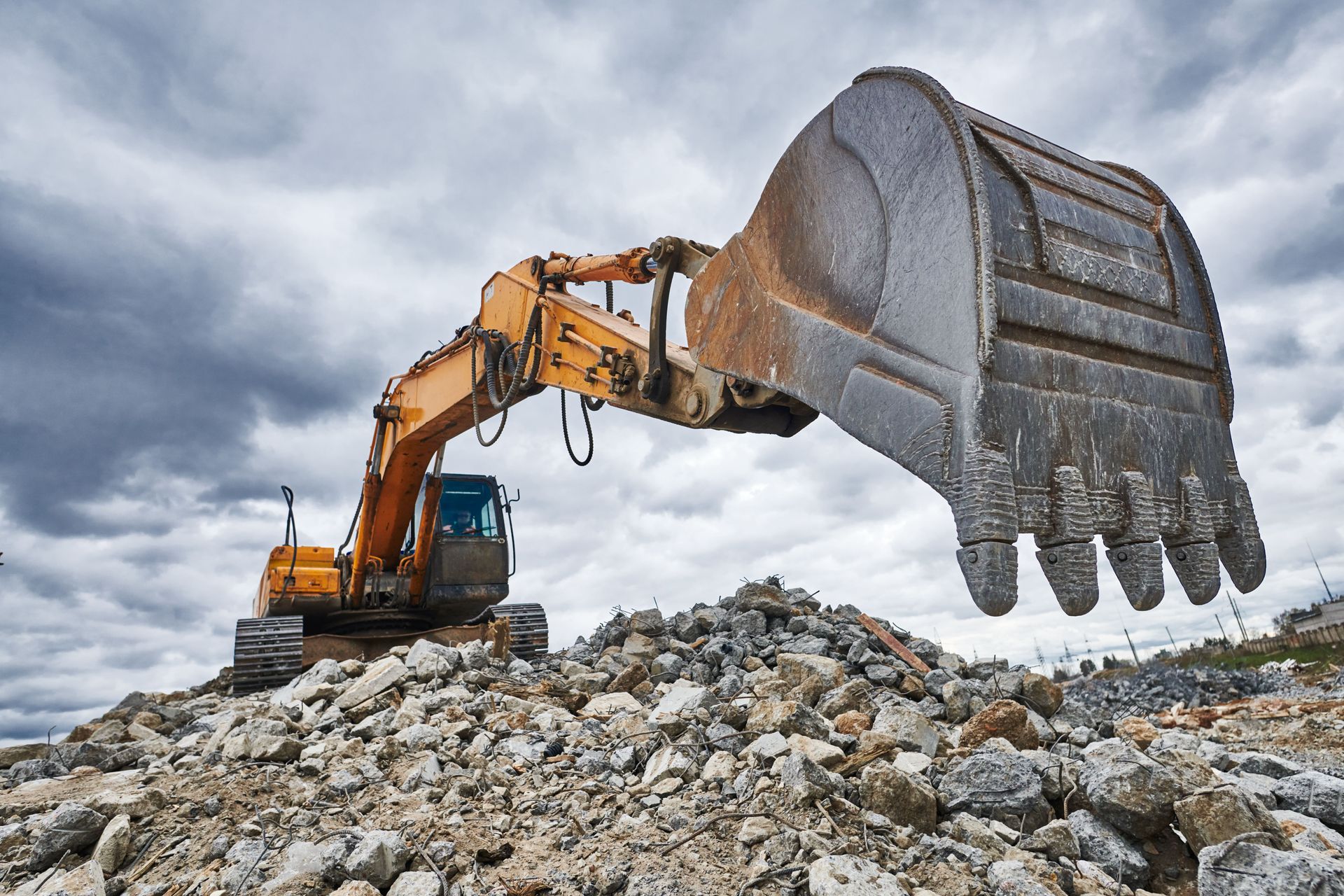September 9, 2025
Excavating contractors play a crucial role in large-scale land developments, as they are responsible for preparing sites and ensuring the ground is stable for future construction. Their work includes a wide range of tasks such as grading, trenching, soil compaction, and managing the logistics of site preparation, all of which are essential to laying the foundation for successful projects. As the construction industry continues to expand, understanding the role of excavating contractors also provides valuable insights into broader industry trends and emerging technologies. This article will further explain the role of these contractors to help unlock a comprehensive understanding of how they contribute to the success and efficiency of modern construction projects.
1. Understanding the Role of Excavating Contractors
Excavating contractors are specialists who manage ground and soil removal, enabling construction to commence on developed sites. Their work involves using heavy machinery like backhoes, bulldozers, and excavation equipment to prepare land for foundations, roads, and utility lines. The scope of these contractors extends beyond digging; they also address grading, trenching, and soil compaction. This expertise ensures that the land is stable and suitable for building, impacting everything from residential homes to massive infrastructure projects. Their primary goal is to transform raw land into a buildable surface, ready for development.
Core responsibilities of excavating contractors include examining project blueprints, understanding regulatory requirements, and securing necessary permits. They also work on determining the type and depth of excavation needed, managing the logistics of soil removal, and preparing the ground for construction. These tasks demand precision and detailed planning to ensure the integrity of future structures. Excavating contractors must also remain adaptable, ready to tackle unforeseen challenges, such as discovering hidden underground utilities or unexpected soil conditions.
The excavation contracting industry comprises a mix of large international firms and smaller regional businesses, each contributing uniquely. Leading companies often have extensive resources, allowing them to handle significant infrastructure projects across multiple states or countries. Smaller contractors, while limited in scope, bring specialized expertise and localized knowledge that large firms may lack. Key players often participate in industry conferences and associations, driving innovation and sharing best practices. Their competition fosters a dynamic market, encouraging advances in technology and methods while improving the quality and safety of excavation services industry-wide.
2. Conducting Pre-Construction Planning and Site Analysis
Pre-construction begins with a detailed site survey to assess physical and environmental conditions. Excavating contractors rely heavily on this data to make informed decisions regarding the suitable approach for the project. Soil testing is vital to understand composition, density, and stability, ensuring that the ground can support upcoming structures. Analyzing these factors helps identify potential issues that might cause delays or add costs if left unaddressed. By comprehensively evaluating a site, contractors can mitigate risks and optimize the use of resources throughout the project's lifecycle.
Identifying and assessing risks is a critical component of an excavating contractor’s planning process. Variables such as soil type, proximity to water bodies, and existing underground utilities require meticulous evaluation. Contractors must develop mitigation strategies to address these risks, including selecting appropriate machinery, adjusting plans for environmental concerns, and planning around utility locations. Effective risk management averts costly delays and improves safety for construction personnel. Successful contractors apply comprehensive risk assessments to refine their approach, adjust timelines, and manage stakeholder expectations efficiently.
Ensuring compliance with regulatory requirements is a non-negotiable duty for excavating contractors. The permitting process involves navigating local, state, and federal regulations, each with its unique requirements and challenges. Contractors must ensure that their activities comply with environmental, safety, and zoning laws, which often differ based on location. The completion of this due diligence not only avoids potential legal issues but also helps in maintaining project timelines. Experienced contractors establish working relationships with local authorities to facilitate smoother permitting processes and more predictable project outcomes.
3. Applying Excavation Techniques and Technologies
Traditional excavation methods continue to play a significant role in modern construction projects, providing a foundational approach to land clearing and preparation. Techniques such as trenching, directional drilling, and grading are commonplace in both small and large-scale developments. These methods rely heavily on manual labor and mechanical equipment, with efficiency and precision influenced by the operator's skill and experience. Despite technological advances, traditional techniques are favored for their reliability and versatility across varied project requirements. When applied properly, they offer a cost-effective solution for extensive land modification tasks.
The evolution of machinery and tools has dramatically enhanced the capabilities of excavating contractors. Advanced equipment such as GPS-controlled excavators, laser-guided grading systems, and high-powered earth movers improve accuracy and reduce labor, completing tasks more swiftly and efficiently. These advancements not only increase productivity but also promote safer work environments by minimizing human error. As the industry continues to grow, projected to reach $145.4 billion by 2025 according to IBISWorld, the advancement of this evolution will become even more critical.
Technological innovations are reshaping the excavation industry, introducing new methods and equipment that enhance efficiency and sustainability. Innovations such as telematics, remote operation systems, and augmented reality provide unparalleled accuracy and control. These technologies enable real-time monitoring and adjustments, optimizing equipment performance and reducing downtime. Furthermore, integration of eco-friendly practices in excavation, such as noise reduction and better fuel management, aligns with increasing environmental regulations.
4. Measuring the Impact of Excavating Contractors on Projects
Excavating contractors are pivotal in ensuring the structural integrity of development projects. Proper excavation and soil management prepare the land for strong, durable foundations, crucial for any construction endeavor. Contractors apply their expertise to mitigate risks associated with soil instability, minimizing potential issues over a structure's lifespan. This proactive approach significantly contributes to the safety and longevity of buildings, infrastructure, and other developments. The meticulous work in securing a reliable building base is fundamental to project success, underpinning future construction stages.
Efficient workflow facilitated by experienced excavating contractors contributes directly to project deadlines and quality assurance. By reducing delays through precise planning and adept resource management, contractors help maintain project schedules and operational momentum. Their strategic interventions streamline construction phases and optimize material use, lowering costs, and resource wastage. This efficiency is not only a testament to their competency but also enhances overall productivity, benefiting both developers and stakeholders.
Enhancing project sustainability is an ever-growing responsibility for excavating contractors as ecological concerns increase. They implement sustainable practices like erosion control, resource recycling, and using environmentally-friendly machinery to minimize ecological impacts. These initiatives attract environmentally-conscious clients and align with current regulatory demands, promoting sustainable development. By reducing their carbon footprint and advocating ecological stewardship, contractors contribute significantly to broader sustainability goals.
Building long-term, trustworthy relationships with developers is crucial for the sustenance and success of excavation businesses. Contractors who consistently deliver on time, on budget, and to high standards naturally earn client confidence and repeat business. These relationships based on trust, mutual respect, and clear communication help with future project acquisitions and collaborations. Developers value reliable partners, knowing that consistent, quality performance reduces risk and ensures smooth project execution. Professional partnerships bridge communication gaps, streamline project phases, and collectively pursue project scope objectives.
Excavating contractors are pivotal to the successful execution of large-scale land developments. Their expertise ensures that sites are prepared for construction, blending precision, efficiency, and sustainability. Understanding their contributions enables stakeholders to collaborate. If your next project requires the service and expertise of quality contractors, get in touch with JUUL Underground to request a free quote today.



